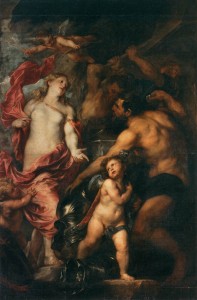
After I finished off the excellent Rubicon (detailing the events and people leading up to the death of the Roman Republic) by Tom Holland, I delved into some pulp stuff for a bit but was itching to complete my reading of Robert Fagles’s Aeneid to tie in the fantasy with the reality. It was a long haul this one. I think I started reading it in 2010 got a bit into it and moved on to other things–lots of other things. Modern translations of the classic trilogy (Iliad, Odyssey and the Roman Aeneid) are amazing compared to the shit we had in the 80’s when I was struggling through some early 1900’s direct translation in High school that had no ear for the words. The modern translations take a lot of liberties with the text and come out amazingly readable in comparison. I started with Stanley Lombardo’s version of the Iliad years ago and immediately went in for his version of the Odyssey. Apparently he actually PERFORMS these stories for audiences. That’s heavy stuff and the lyricism used in actual telling was not lost in his translation.
My dad gave me the Robert Fagles’s version of the Aeneid and I was skeptical at first but it turned out to be an excellent read– though Virgil is much longer winded than Homer I felt.
The plot is this– Troy gets sacked after the Iliad ends (we never get to see the sacking from Homer though) and apparently a bunch of Trojans survive and head out to found a second Troy. Aeneas is their leadeger and he knows he is destined eventually to found a city in Latinum (Italy). He fucks around a bit on his boats and ends up in Carthage betrothed to the queen there: Dido. He’s fucking her all across the palace for months and months and then has a vision of his destiny and clears out that night with his fellow Trojans. Dido tries to stop him and then kills herself. There’s some more stuff on boats (sounds like the Odyssey doesn’t it) and Aeneas goes to talk to his dad in the underworld, seeing future Roman leaders in the process (?!). His dad tells him to go kick ass. Eventually, the Trojans get to Latinum and the Latins are at first amicable, with the King betrothing his daughter to Aeneas. Unfortunately the gods all get involved because Juno (Hera) is still fucking raging pissed at the Trojans over the whole golden apple thing that started it all (if you trace it way back, it was the seduction of Atalanta that began this whole bloodfest) and they fuck up the betrothal and everyone starts throwing down. The rest of the book is the Iliad again with fighting on chariots and 99% of the characters dying in the paragraph that they are introduced. This is an amazing part of the book with the gods trying to help out their favorites, chicks fighting with bare breasts on chariots, people using magic weapons and armor and a lot of people, surprisingly, getting brained to death by rocks and boulders. The book ‘The sword decides all” is probably the best in the entire thing with just a massive dust up after an attempt at a peace treaty is fucked up by the gods again. And the end, like the Iliad, just sort of stops when the main antagonist (Turnus) is killed. That’s the end. No denouement or anything like that. Turnus hits the ground and that’s the last paragraph in this giant tome. Amazing.
So how is it? The Iliad and Aeneid are sort of tied for good reads, while the Odyssey is by far the best because it’s just about this one guy and his desire to get home, and I really felt I could relate to that a ton more than all the hero fighting. There’s not a lot of confusion in the Odyssey about all these other characters and their motivations as well. You really don’t know what’s going to happen to him in the end– what the COST will be for him to get home and what home is like. Whereas the Aeneid, you know Rome is going to be founded (not by him though) and it’s really just watching Aeneas kick ass to get there and having his friends die. Yet, once he started balling Dido– I was like “Who is this guy?” The whole Dido distraction doesn’t make as much sense as the Circe one in the Odyssey. In the Iliad, there is this huge group of Greek heroes that you start to figure out CANNOT BE KILLED and every time they fight they just kill everyone. Achilles? Ok badass, but there are so many Greek heroes that are made to seem just as powerful, the Iliad seems like an episode of the Superfriends to me. The verdict? Don’t bother with the Aeneid if you haven’t read the Iliad. You could skip the Odyssey, but since it’s the best one you may as well read it before the Aeneid as well. The Fagles version is excellent and I will likely pick up the Lombardo one for a comparison of the translation. Don’t mess around with stuff not translated by either of these two. You will die of fucking boredom.